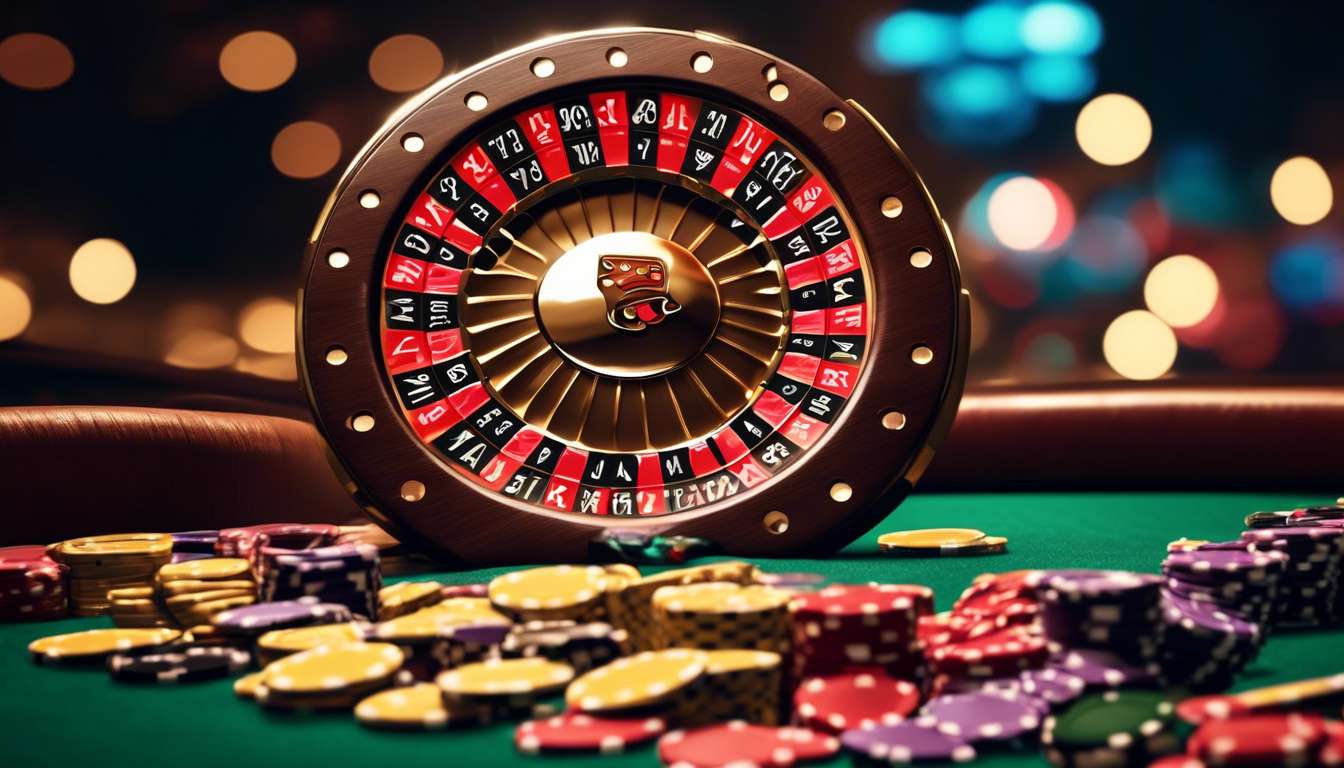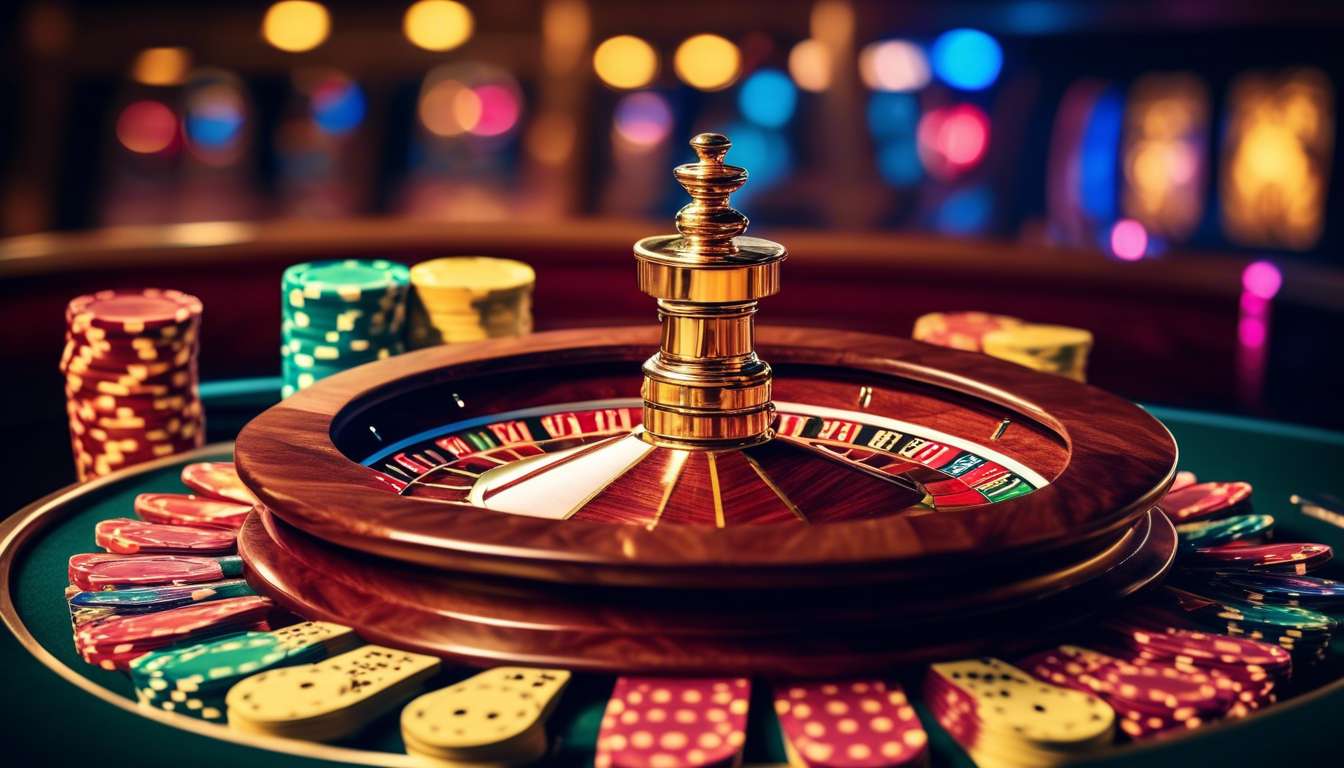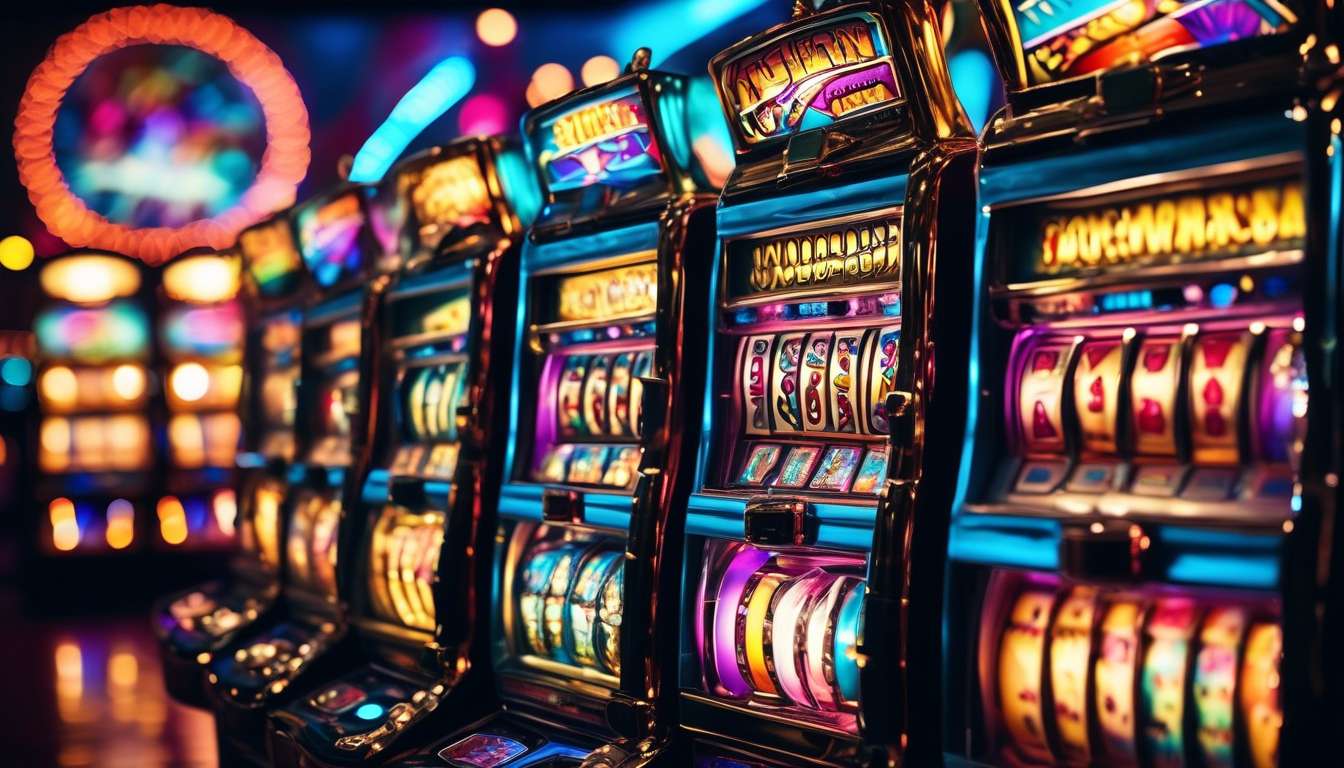In the vibrant world of casinos, we often find ourselves debating the merits of table games versus slots. Both offer unique experiences, yet they cater to different types of players. As enthusiasts, we’ve explored the nuances of these two popular gaming avenues, and it’s clear that each has its own charm and appeal.
Table games invite us into a realm of strategy and social interaction, where the roll of the dice or the turn of a card can change everything.
On the other hand, slots are the epitome of randomness and simplicity, providing us with thrilling spins and the allure of instant jackpots.
In this article, we delve into ten key contrasts between table games and slots, examining aspects such as player involvement, odds, and atmosphere. By understanding these differences, we can better appreciate what each game has to offer and choose our entertainment accordingly.
Key Contrasts:
-
Player Involvement
- Table games require a higher level of player involvement and decision-making.
- Slots offer a more passive gaming experience.
-
Strategy
- Table games often involve strategic thinking and skill.
- Slots rely purely on chance and luck.
-
Social Interaction
- Table games promote social interaction with other players and dealers.
- Slots are typically a solitary experience.
-
Odds
- Table games often have better odds, especially for skilled players.
- Slots typically have higher house edges.
-
Pace of Play
- Table games may have a slower, more deliberate pace.
- Slots offer fast-paced, continuous action.
-
Atmosphere
- Table games create a lively, engaging atmosphere.
- Slots provide a more relaxed, individual experience.
-
Variety
- Table games include a variety of options like poker, blackjack, and roulette.
- Slots offer a wide array of themes and styles.
-
Investment
- Table games may require a higher initial investment.
- Slots can be played with smaller bets.
-
Payouts
- Table games can offer consistent smaller wins.
- Slots have the potential for large jackpots.
-
Learning Curve
- Table games often have a steeper learning curve.
- Slots are easy to understand and play instantly.
By recognizing these contrasts, players can make informed choices about which type of game might suit their preferences and enhance their casino experience.
Player Engagement Levels
Player Engagement Levels
When comparing player engagement levels between table games and slots, each offers unique attractions:
Table Games:
- Social Interactions: Players are captivated by the shared experience where interaction with the dealer and fellow players is key. This creates a sense of camaraderie and belonging.
- Strategic Depth: Players can employ strategies, making each decision feel significant as they assess odds and anticipate the next move.
Slots:
- Simplicity and Vibrant Themes: Players are drawn to the bright visuals and straightforward gameplay, which provide an immediate thrill.
- Personal Escape: Although slots lack the social aspect of table games, they offer the opportunity to enjoy the game at one’s own pace.
- Straightforward Odds: The allure of slots lies in the chance of hitting a big win with just a push of a button, offering a simple yet exciting experience.
Gaming Strategies
When it comes to gaming strategies, players employ different approaches to maximize their chances of success in both table games and slots.
Table Games:
- Strategy plays a pivotal role in table games.
- Being part of a community where player interaction is key allows us to leverage each other’s insights.
- By understanding the odds and employing skillful tactics, we enhance our chances of winning.
- Whether it’s perfecting our poker face or mastering blackjack’s basic strategy, we’re actively involved in shaping the outcome.
Slots:
- Slots offer a more individual experience with predetermined odds.
- While there’s less room for strategic maneuvering, excitement still arises from selecting machines with favorable payouts or engaging in progressive jackpots.
- Our strategy might focus more on:
- Bankroll management.
- Knowing when to switch machines.
- Deciding when to call it a day.
Even in this solitary endeavor, the thrill of potential wins keeps us connected, sharing in the collective hope of hitting that big jackpot.
Social Dynamics
Social Dynamics in Table Games
In table games, player interaction is at the forefront.
- We become part of a team, sharing strategies and tips as we collectively aim to beat the dealer.
- This sense of camaraderie creates a bond, making each win feel like a shared victory.
- Table games demand strategy, and the odds can shift based on our decisions, drawing us closer as we engage in this vibrant social atmosphere.
Social Scene in Slots
Conversely, slots offer a different social experience.
- Although often played individually, the excitement is contagious.
- While we might not be strategizing together, we share in the collective thrill of watching reels spin and aligning our hopes with others nearby.
- The odds are fixed, yet there’s a shared understanding and anticipation in the air.
Conclusion
Whether we’re at a table or a slot machine, the social dynamics draw us in, creating unforgettable gaming moments.
Winning Odds
When considering our chances of winning, table games and slots present distinctly different probabilities.
Table Games:
- We often have the opportunity to interact directly with the dealer and other players, creating a sense of camaraderie and shared experience.
- This interaction allows us to employ strategies that can influence the odds in our favor.
- Games like blackjack and poker rely on skill and decision-making, giving us a sense of control over our fate.
Slots:
- Offer a solitary experience where strategy takes a backseat.
- The odds are fixed and mostly based on luck, with little room for player interaction.
- There’s a certain thrill in pulling the lever or pressing the spin button, but we must acknowledge that our influence over the outcome is minimal.
Ultimately, our choice between table games and slots depends on personal preference:
-
Strategic Engagement and Social Aspect: If we enjoy using strategy and interacting with others, table games might be more appealing.
-
Straightforward, Luck-Based Excitement: If we prefer a simpler, luck-based experience, slots might be more suitable.
Each option offers unique odds, shaping our gaming experiences in different ways.
Speed of Gameplay
Comparing Speed of Gameplay: Table Games vs. Slots
Table Games:
- Offer a slower rhythm that encourages player interaction and camaraderie.
- Allow for engagement in strategy and discussions about odds with fellow players.
- Provide a collective experience where connections are formed and a sense of belonging is fostered.
Slots:
- Provide a fast-paced experience with quick transitions from one spin to the next.
- Ideal for players who prefer quick, solo play without the need for strategy or interaction.
- Focus on the thrill of immediate results and the anticipation that comes with each spin.
Whether drawn to the strategic depth of table games or the rapid excitement of slots, both options cater to different player preferences, offering unique experiences.
Gaming Atmosphere
The gaming atmosphere in casinos varies greatly between table games and slots, offering distinct experiences that cater to diverse player preferences.
Table Games:
- We find ourselves immersed in a social setting where player interaction is key.
- There is an opportunity to engage with dealers and fellow players, sharing strategies and tips.
- This camaraderie fosters a sense of belonging, as everyone strives to outsmart the odds together.
- The strategic element requires critical thinking, requiring players to consider each move carefully.
Slots:
- Slots provide a more individual experience.
- The atmosphere is often filled with bright lights and captivating sounds, drawing players into their own world.
- Player interaction is minimal, yet there is still the thrill of anticipation as the reels spin, hoping for a lucky combination.
- Odds are more fixed, leaving strategy aside and relying purely on chance.
Conclusion:
Whether we prefer the communal feel of table games or the solitary thrill of slots, both atmospheres offer unique and exciting experiences.
Game Variety
Casinos offer a wide array of games, allowing us to explore diverse options between table games and slots.
Table Games:
- In the realm of table games, we find ourselves drawn into experiences rich with player interaction and camaraderie.
- Games like poker and blackjack invite us to engage, connect, and strategize together.
- We rely on our skills and personal strategies to tip the odds in our favor.
- This fosters a sense of community as we share our triumphs and learn from our losses.
Slot Machines:
- On the other hand, slot machines offer a different kind of excitement.
- With endless themes and styles, slots captivate us with their simplicity and variety.
- They don’t require deep strategies or interaction, allowing us to enjoy the thrill at our own pace.
- The odds are determined by chance, and while we may not share the same level of interaction, the shared anticipation of a big win creates a unique bond among players.
Personal Preferences:
- Our choices between these games reflect our personal preferences.
- The variety ensures we all find our place in the casino.
Financial Commitment
When considering financial commitment in casino games, it is important to evaluate the differing costs associated with table games and slots.
Table Games:
- Our financial involvement often depends on the level of Player Interaction and Strategy we choose to engage with.
- We might need to invest time and money in understanding the nuances and odds of games like poker or blackjack.
- This investment can create a sense of community as we strategize with others, enhancing our sense of belonging.
Slots:
- Offer a more straightforward financial commitment.
- We can decide the amount we’re willing to spend, with no requirement for deep strategic thought or interaction with other players.
- This simplicity might appeal to those who prefer a solitary gaming experience or are new to the casino environment.
- However, the odds in slots are typically less favorable compared to table games, potentially affecting long-term financial outcomes.
Ultimately, our choice between table games and slots reflects our preferences for interaction, strategy, and risk.
What are the legal age requirements for playing table games and slots in different jurisdictions?
In various jurisdictions, the legal age requirements for playing table games and slots differ.
It’s important to know the specific regulations in each location to ensure compliance. By understanding the age restrictions, we can enjoy our gaming experiences responsibly and within the boundaries of the law.
Always remember to:
- Check the age requirements before participating in any casino activities.
This will help avoid any legal issues.
How do the payout mechanisms differ between table games and slot machines?
When it comes to payout mechanisms, table games and slot machines operate differently.
Table Games:
- Payouts are based on the odds and the type of bet placed.
- Winnings are often provided in the form of chips, which can be exchanged for cash.
Slot Machines:
- Use a random number generator to determine payouts.
- Winnings are usually provided in the form of coins or credits, which can be redeemed for cash.
The distinction in payout methods adds variety to our gaming experiences.
Are there any technological innovations specific to table games or slots that enhance the gaming experience?
We’ve noticed some exciting technological advancements in both table games and slots that really amp up the gaming experience.
Table Games:
- Interactive touch screens at tables enhance player interaction and engagement.
- Real-time data and analytics provide players with insights and strategies.
Slot Machines:
- Immersive sound and graphics create a captivating atmosphere.
- Advanced algorithms offer more personalized gaming experiences.
These innovations keep us engaged and entertained. It’s amazing how technology has transformed the way we play and enjoy our favorite games.
The future of gaming looks bright with these enhancements!
Conclusion
In conclusion, when it comes to table games versus slots, the key contrasts lie in several areas:
-
Player Engagement Levels: Table games often require more interaction and decision-making, while slots are typically more passive.
-
Gaming Strategies: Table games like poker and blackjack involve strategic thinking, whereas slots rely on luck.
-
Social Dynamics: Table games provide a social environment where players can interact with each other and the dealer, unlike slots which are usually solitary.
-
Winning Odds: Table games often present better odds for strategic players, while slots have fixed odds.
-
Speed of Gameplay: Slots offer a fast-paced experience, while table games can vary in speed depending on the type of game.
-
Gaming Atmosphere: Table games have a classic casino feel with a live dealer, while slots are more modern with flashing lights and sounds.
-
Game Variety: Slots offer a wide variety of themes and features, whereas table games focus more on traditional card and dice games.
-
Financial Commitment: The cost to play can differ significantly, with table games often requiring higher minimum bets than slots.
Each type of game offers a unique experience, catering to different preferences and playing styles. Whether you enjoy the strategic challenge of table games or the fast-paced thrill of slots, there’s something for everyone in the world of casino gaming.



